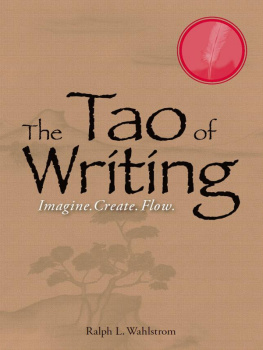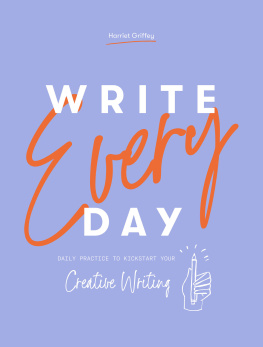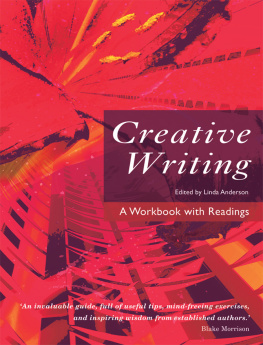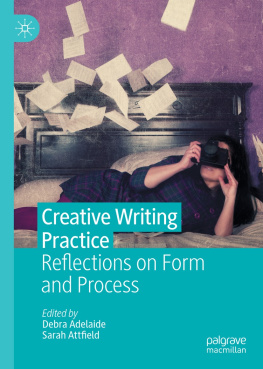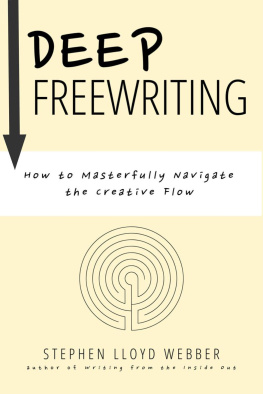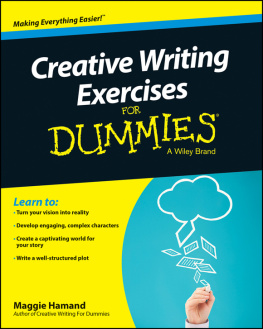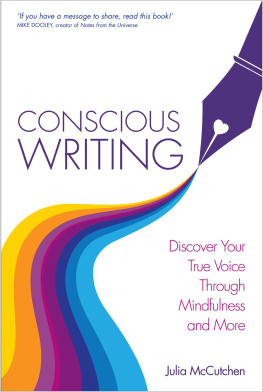The Tao of
Writing
Imagine. Create. Flow.
Ralph L. Wahlstrom

Adams Media
Avon, Massachusetts
Copyright 2006 by Ralph L. Wahlstrom.
All rights reserved. This book, or parts thereof, may not be reproduced in any form without permission from the publisher; exceptions are made for brief excerpts used in published reviews.
Published by
Adams Media, a division of F+W Media, Inc.
57 Littlefield Street, Avon, MA 02322. U.S.A.
www.adamsmedia.com
ISBN 13: 978-1-59337-404-4
ISBN 10: 1-59337-404-6
Printed in the United States of America.
10 9 8 7 6 5 4 3
Library of Congress Cataloging-in-Publication Data
Wahlstrom, Ralph L.
The Tao of writing : imagine, create, flow / Ralph L. Wahlstrom.
p. cm.
Includes bibliographical references.
ISBN 1-59337-404-6
1. Authorship--Philosophy. 2. Authorship--Psychological aspects. I. Title.
PN175.W34 2005
808.001--dc22
2005026449
This publication is designed to provide accurate and authoritative information with regard to the subject matter covered. It is sold with the understanding that the publisher is not engaged in rendering legal, accounting, or other professional advice. If legal advice or other expert assistance is required, the services of a competent professional person should be sought.
From a Declaration of Principles jointly adopted by a Committee of the
American Bar Association and a Committee of Publishers and Associations
Many of the designations used by manufacturers and sellers to distinguish their products are claimed as trademarks. Where those designations appear in this book and Adams Media was aware of a trademark claim, the designations have been printed in initial capital letters.
This book is available at quantity discounts for bulk purchases.
For information, call 1-800-289-0963.
Contents
Dedication
It isn't easy to write a dedication. We are the consequences of countless influences, of being touched by so many people in our lives that it is virtually impossible to do them justice. Then, of course, there is the question of whether or not our work can do them justice. Here goes. First, I dedicate this manuscript to my wife Cynthia, without whom none of this could have happened. I also have to thank Diana George, my teacher, mentor, and friend whose rigorous scholarship and gentle way inspired and guided me through my studies. Thank you, John Kuhn, Dick Carter, and Sister Emerita Joseph. You each lived the Tao in your own way. I am also grateful to my student, Dana, who planted the seed, and to a generous Peter Elbow, who gave it water. Finally, I dedicate this book to my loving parents, Anna and Leroy, whose kindness, generosity, and love are the most profound kind of inspiration.
Preface
Something has happened to me as I've experienced the writing of this book. The project began almost by chance, an interesting idea taken partly from a student paper called The Tao of Tutoring and a chalkboard demonstration for one of my writing classes.
I had always found the East fascinating and had been drawn to Taoist philosophy since my teen years. Events and influences accumulated in the ensuing years until that one day when, in an almost offhand way, I found myself writing The Tao of Writing across the top of the chalkboard. The idea took root and began to grow. I became so intrigued by the subject, the increasingly clear connections between writing and the Tao, that I kept at it, picking away, adding a little here and there, generally avoiding real work to play at my Tao piece whenever I could manage it. At first I approached it the way I would normally plan and work on most academic writing. I gathered my sources and began plugging things in that seemed to fit, being sure to cite the appropriate experts along the way. Then the whole thing began to shift away from the conventional and rigid form of scholarship to something more personal and, at the same time I think, more universal. I would even dare to say that I began to write in the Tao rather than writing about it.
First, I had to discover why I was writing a book about Taoismand, in fact, why I was writing at all. I am no great Taoist scholar and, as one scholarly friend once told me, I'm not exactly an intellectual either. So how is it my place to write a book entitled The Tao of Writing?
My first instinct was to follow a familiar path, a scholarly format if not a highly intellectual one. But as I read what I wrote, I found I didn't like the parts that discussed composition theory and formal practice. It's what I knew intellectually, but it didn't feel right. What I liked best were the places where I spoke about writing by looking at other things, other parts of life. I found metaphors for the Tao of writing in my music and fiction and, ultimately, in art. My friend was rightI am not an intellectual. I tend to be more in tune with my feelings than with academic theories. I don't give exams in my writing classes, because I believe they have nothing to do with becoming a writer. And although I've spent many years reading current theories on writing and rhetoric, and I enjoy the conversation immensely, I see little use for most of it in a writing classroom. Writing is a combination of sensation, experience, and knowledge.
So, I needed to cut myself free of the restrictions I had imposed on this text. I stopped keeping count of the words I had written up to that point. I was no longer trying to write a book. I was, instead, just writing. I also decided to step away from composition technique and theory, at least as much as seemed reasonable, and to explore other areas that seemed more in tune with the Tao. To that end I picked up books on creativity and flow by Mihaly Csikszentmihalyi and a strange little book called On Not Being Able to Paint, written by psychologist Marion Milner in 1957.1 found inspiration in one of my favorite books, A River Runs Through It, as well as in the writings of Ray Bradbury, the music of James Taylor, and in my long bicycle rides through the hills of rural Western New York. And I returned to a hobby that had been a passion when I was younger, painting viii and illustration. Over the years, as my painting has become more formal, more structured and bound in technique and form, it's also become boring. This writing, this experience has freed me to again paint and draw without worrying about being right. So, just as I've stopped struggling to get a line or color right, I've stopped counting words, and I'm not concerned that I have to cover the fine points of composition theory.
I'm also not so worried about whether this is a book that will appeal to my friends and colleagues who are or wish to be intellectuals. The other day I heard a discussion on the radio about J. R. R. Tolkien's Lord of the Rings trilogy. The popularity of the remarkable new film versions of the books had raised a lot of interest in the works, so NPR's Talk of the Nation had brought a group of well-known authors together to revisit Tolkien's fantasy world. A listener sent the panel a comment in which he called the work dull and intellectually uninteresting. When asked to respond to the criticism, one of the show's guests, author Ursula Le Guin, laughed and said, I feel sorry for him. Ray Bradbury, one of my favorite writers as I was growing up, writes about the day he stopped worrying about the critics. He was nine years old and had a passion for Buck Rogers comics. When his fourth-grade cronies chided him for reading such childish stuff, he went home and tore his comics to pieces. A month later, the young boy made his choice. He writes, I went back to collecting Buck Rogers. My life has been happy ever since. For that was the beginning of my writing science fiction. Since then, I have never listened to anyone who criticized my taste in space travel, sideshows, or gorillas. When this occurs, I pack up my dinosaurs and leave the room (Bradbury, 52). (
Next page
